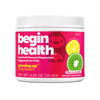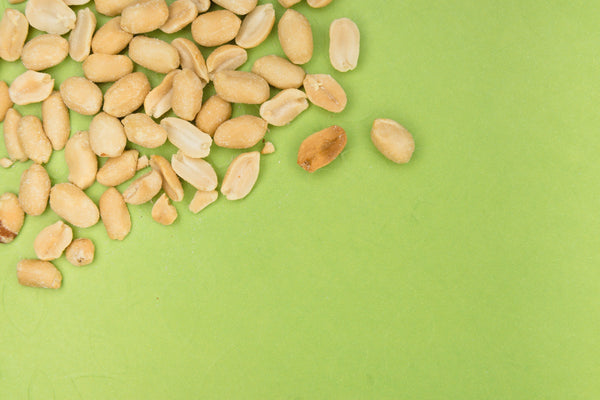- Introduction
How to Choose the Best Magnesium for Digestion and Gut Support
- Introduction

When you’re focused on helping your little one’s gut health, magnesium deserves a spot in your toolkit. As a fundamental mineral, magnesium plays important roles in muscle and nerve function in the digestive tract. Certain forms of magnesium also offer extra support for bowel regularity and constipation relief.
If your child is dealing with constipation or discomfort, the right magnesium for digestion can make a big difference. We’re breaking down how this mineral supports gut health, which forms work best for which purpose, how it stacks up against fibers and prebiotics, and how to use it safely for kids.
How Magnesium Supports Healthy Digestion
Magnesium affects digestion in multiple ways. First, it supports muscle and nerve function in the digestive tract. The intestines rely on coordinated contractions to move stool along, and magnesium is crucial for smooth neuromuscular signaling. Without enough magnesium, gut muscles can become sluggish, which can lead to constipation. Magnesium also helps regulate blood sugar and blood pressure, which can indirectly support digestive function by reducing stress on the gut.
How else is magnesium good for digestion? Magnesium helps with bowel regularity through osmotic effects. Forms such as magnesium citrate pull water into the intestines, softening stool and making it easier to pass. This is particularly helpful for kids struggling with constipation or irregular bowel movements. Magnesium supplements for digestion work quickly compared with fiber alone, providing relief while supporting normal bowel function.
Magnesium also interacts with the gut microbiome. Some studies suggest magnesium supports the balance of beneficial bacteria, which we need for nutrient absorption and digestive enzyme activity. A diet with magnesium-rich foods, such as whole grains and nuts, along with prebiotics and fiber, can help your kid’s gut microbiome thrive.
How Magnesium Compares to Fiber and Prebiotics for Digestion
Fiber supplements and prebiotics support gut health by increasing stool bulk and feeding beneficial gut microbes. They promote gradual improvement in regularity. But magnesium works differently: it influences the muscles and nerves of the digestive tract and adjusts water content in the colon, which offers more immediate relief from constipation.
Many families combine a kid's magnesium supplement with fiber supplements. For example, giving magnesium for digestion at a different time than high-fiber foods can prevent overly soft stools while still supporting gut health. Our Growing Up Prebiotics are designed to gently support bowel movements, and pairing it with the right magnesium supplement for constipation gives extra relief for digestive discomfort.
Magnesium for Constipation Relief in Kids: What Parents Need to Know
Constipation in kids can cause bloating and stomach aches. Certain forms of magnesium, like magnesium citrateand magnesium oxide, work as osmotic laxatives. Magnesium’s osmotic effect makes stools softer and easier to pass. This can be especially helpful for kids with infrequent bowel movements or hard stools. Unlike laxatives that irritate the gut, magnesium works by supporting the digestive tract’s natural motility.
Research continues to show that magnesium can safely help with kids’ constipation:
- In a clinical trial published in 2023, magnesium hydroxide worked well for improving bowel regularity in kids.
- A 2024 study on magnesium oxide found that it improved stool frequency and remained safe when used with proper monitoring.
- A 2020 study with children under the age of six concluded that magnesium oxide increased defecation frequency and improved stool consistency without causing a toxic rise in serum magnesium levels.
- A study of children ages 1–14 years with functional constipation found that magnesium oxide improved stool frequency without major side effects.
Together, these findings show why magnesium for kids’ constipation is considered a gentle, evidence-backed option for supporting digestion and gut comfort.
Parents can take several practical steps when using magnesium for constipation in kids:
- Always talk with your pediatrician before starting a magnesium supplement.
- Make sure your kiddo drinks enough water, as hydration helps magnesium soften stools.
- Track stool frequency, consistency, and any digestive discomfort. Adjust or pause the supplement if stools become too loose.
- Continue basic gut support habits: balanced diet, adequate fiber, physical activity, and routine bathroom habits.
Best Forms of Magnesium for Digestion and Gut Support
Different forms of magnesium have unique benefits. Understanding each type can help parents choose the right option for their little one.
Magnesium Citrate: Gentle Relief for Constipation
Magnesium citrate is well absorbed and commonly used for constipation relief. It attracts water into the intestines which softens stools and gets them moving. It’s suitable as a magnesium supplement for digestion, not just constipation. Make sure to give magnesium citrate with a full glass of water, and consult a pediatrician about dosing.
Magnesium Oxide: Widely Used but Less Absorbed
Magnesium oxide is used in supplements because it is inexpensive and effective as a laxative. However, it has lower absorption for general nutritional support. It still supports bowel regularity, but if your kiddo needs magnesium for other benefits like blood sugar control or anxiety reduction, other forms may be better. Higher doses sometimes cause digestive discomfort.
Magnesium Glycinate: Gentle on the Stomach
Magnesium glycinate is highly absorbable and unlikely to cause digestive discomfort. It’s ideal for general magnesium support, not constipation relief. It’s also a good magnesium for kids’ anxiety because glycinate is linked with calming effects.
Other Magnesium Types Parents Might See
You might also come across magnesium sulfate, magnesium taurate, magnesium malate, or magnesium carbonate. Each of these work a little differently:
- Magnesium sulfate (Epsom salts) can act as a laxative, but it’s not something most pediatricians recommend for regular use.
- Magnesium taurate is better known for supporting heart health and blood pressure, not for helping with constipation.
- Magnesium carbonate may help neutralize stomach acid and support digestion in some cases, though it’s not usually given to kids.
The best options are magnesium citrate and magnesium oxide to get your kiddo pooping, while magnesium glycinate is a gentle choice for everyday support.
Safe Dosage and Safety Precautions for Kids
Dosage for Nutritional Support
The safe daily magnesium dosage for children depends on age.
According to the National Institutes of Health (NIH) Office of Dietary Supplements, average daily recommended amounts (all sources) are:
- Birth to 6 months: 30 mg/day
- 7–12 months: 75 mg/day
- Kids 1–3 years: 80 mg/day
- Kids 4–8 years: 130 mg/day
- Kids 9–13 years: 240 mg/day
In addition to supplements, your family can get magnesium from leafy greens, beans, lentils, nuts, seeds, whole grains, and fortified cereals. The maximum daily dosage (supplements and medications only) is:
- Birth to 12 months: not established
- Kids 1–3 years: 65 mg/day
- Kids 4–8 years: 110 mg/day
- Kids 9–18 years: 350 mg/day
Dosage for Constipation Relief
As a laxative for kids, magnesium dosages differ and require pediatric guidance:
-
Magnesium citrate dosage
- For kids under 6 years: 0.5 mL/kg every 4 to 6 hours as needed (max 200 mL/day)
- For kids 6 to 12 years: 100 to 150 mL orally one time
-
Magnesium hydroxide dosage
- Oral liquid for kids 2 to 5 years: 400 mg to 1200 mg once a day (max 1200 mg/day) for up to 7 days
- Oral liquid for kids 6 to 11 years: 1200 mg to 2400 mg once a day (max 2400 mg/day) for up to 7 days
- Dosage may differ for oral suspension and tablets.
Always check the manufacturer's label and talk with your pediatrician. Track stools, digestive comfort, and behavior to monitor how magnesium affects your kiddo.
Safety and Side Effects
Common side effects include loose stools, cramping, and nausea. Overuse may cause electrolyte imbalance or magnesium toxicity.
Watch closely for side effects if your little one has kidney issues, low blood pressure, or takes other medications affecting magnesium. Start with a low dosage, observe its effects, and adjust dosing as needed.
Try giving magnesium and fiber. Fiber adds bulk, which may reduce the risk of loose stools.
Gentle Gut Support: Begin Health Prebiotics and Magnesium
Combining magnesium for digestion with prebiotics helps foster a healthy gut microbiome while supporting bowel regularity. Begin Health Growing Up Magnesium contains kid-friendly magnesium chosen for absorption and gentle digestive support. It pairs magnesium with prebiotics from kiwifruit powder and inulin to support gut bacteria and offers clean-label, third-party tested ingredients good for daily use.
Try giving your kid magnesium supplements alongside meals or snacks, and track improvements in their bowel consistency, mood, and digestive comfort. Combined with fiber supplements, prebiotics, and hydration, magnesium supplements for digestion help with long-term digestive wellness while supporting healthy blood sugar and blood pressure levels.
Get started with Growing Up Magnesium for your kiddo’s best gut health today!

Author
May Zhu, RDN
May is the Registered Dietitian Nutritionist and nutrition expert at Begin Health.
View Citation
- [1] Schutten, J. C., Joris, P. J., Groendijk, I., Eelderink, C., Groothof, D., Van Der Veen, Y., Westerhuis, R., Goorman, F., Danel, R. M., De Borst, M. H., & Bakker, S. J. L. (2022). Effects of Magnesium Citrate, Magnesium Oxide, and Magnesium Sulfate Supplementation on Arterial Stiffness: A Randomized, Double‐Blind, Placebo‐Controlled Intervention Trial. Journal of the American Heart Association, 11(6). https://doi.org/10.1161/jaha.121.021783
- [2] Siegel, J. H., & Di Palma, J. A. (2005). Medical Treatment of Constipation. Clinics in Colon and Rectal Surgery, 18(02), 76–80. https://doi.org/10.1055/s-2005-870887
- [3] Blancquaert, L., Vervaet, C., & Derave, W. (2019). Predicting and Testing Bioavailability of Magnesium Supplements. Nutrients, 11(7), 1663. https://doi.org/10.3390/nu11071663
- [4] Carpenter, T. O., DeLucia, M., Zhang, J., Bejnerowicz, G., Tartamella, L. D., Dziura, J., Petersen, K. F., Befroy, D. E., & Cohen, D. (2006). A Randomized Controlled Study of Effects of Dietary Magnesium Oxide Supplementation on Bone Mineral Content in Healthy Girls. The Journal of Clinical Endocrinology and Metabolism, 91(12), 4866–4872. https://doi.org/10.1210/jc.2006-1391
- [5] Maor, N. R., Alperin, M., Shturman, E., Khairaldeen, H., Friedman, M., Karkabi, K., & Milman, U. (2017). Effect of Magnesium Oxide Supplementation on Nocturnal Leg Cramps. JAMA Internal Medicine, 177(5), 617. https://doi.org/10.1001/jamainternmed.2016.9261
- [6] Kappeler, D., Heimbeck, I., Herpich, C., Naue, N., Höfler, J., Timmer, W., & Michalke, B. (2017). Higher bioavailability of magnesium citrate as compared to magnesium oxide shown by evaluation of urinary excretion and serum levels after single-dose administration in a randomized cross-over study. BMC Nutrition, 3(1). https://doi.org/10.1186/s40795-016-0121-3
- [7] Ates, M., Kizildag, S., Yüksel, O., Hosgorler, F., Yüce, Z., Guvendi, G., Kandis, S., Karakilic, A., Koc, B., & Uysal, N. (2019). Dose-Dependent Absorption Profile of Different Magnesium Compounds. Biological Trace Element Research, 192(2), 244–251. https://doi.org/10.1007/s12011-019-01663-0
- [8] Closa-Monasterolo, R., Ferré, N., Castillejo-DeVillasante, G., Luque, V., Gispert-Llauradó, M., Zaragoza-Jordana, M., Theis, S., & Escribano, J. (2016b). The use of inulin-type fructans improves stool consistency in constipated children. A randomised clinical trial: pilot study. International Journal of Food Sciences and Nutrition, 68(5), 587–594. https://doi.org/10.1080/09637486.2016.1263605
- [9] Kubota, M., Ito, K., Tomimoto, K., Kanazaki, M., Tsukiyama, K., Kubota, A., Kuroki, H., Fujita, M., & Vandenplas, Y. (2020). Lactobacillus reuteri DSM 17938 and Magnesium Oxide in Children with Functional Chronic Constipation: A Double-Blind and Randomized Clinical Trial. Nutrients, 12(1), 225. https://doi.org/10.3390/nu12010225
- [10] National Institutes of Health Office of Dietary Supplements. Magnesium Fact Sheet for Health Professionals. https://ods.od.nih.gov/factsheets/Magnesium-HealthProfessional/
-
Buy Now
Join the
Happy Gut Club
Daily reads to help your little ones lead happier and healthier lives.


















